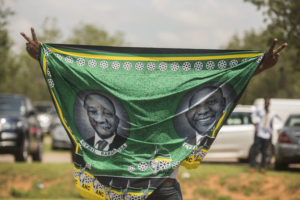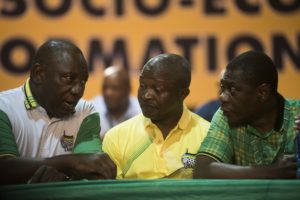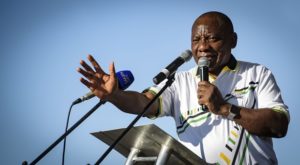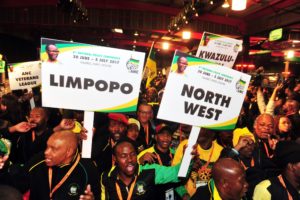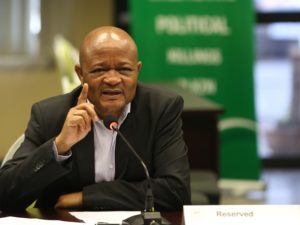Thebogo Khaas: Is Ramaphosa’s mission possible?

PRETORIA, SOUTH AFRICA, NOVEMBER 26, 2017: Deputy President Cyril Ramaphosa addresses the African National Congress (ANC) Tshwane Rally at the TUT Soshanguve Campus on November 26, 2017 in Pretoria, South Africa. Ramaphosa discussed his ideas for the ANC and added that the party must go back to their old days when Nelson Mandela was president. (Photo by Gallo Images / Netwerk24 / Lisa Hnatowicz)
Deputy president and ANC presidential hopeful Cyril Ramaphosa is a man on a mission.
He recently reasserted his fitness and readiness for the position he has spent the past five years serving as an intern to. The incumbent, President Jacob Zuma, has, in turn, made clear his preference that his ex-wife and ANC MP Nkosazana Dlamini-Zuma succeed him as party president.
As he does so, Ramaphosa has tapped an artery close to the heart of the ANC’s malaise, with unpredictable outcomes.
Let me explain.
South Africa is the most developed country in Africa. It boasted the largest economy until 2014, when the continent’s most populous country, Nigeria, overtook it.
Between 1994 and 2008, South Africa’s economic and political fundamentals were the envy of many. During that period, the economy registered impressive achievements, including the all-time (since 1968) lowest inflation rate of 0.2% in 2004.
Thanks to tight fiscal discipline and a relatively stable political environment under presidents Nelson Mandela and Thabo Mbeki, South Africa earned admiration as it became Africa’s and the world’s economic and political poster child.
With the gross domestic product (GDP) growth rate peaking at 7.1% in 2006, the country’s future was set on a sound economic platform upon which peace and prosperity could be assured.
Despite the 2008 global economic hardship triggered by the US financial meltdown, South Africa’s relatively sound fiscal and macroeconomic systems seemed geared to withstand exogenous economic pressures.
For a while, the ANC government could afford to levitate on its political hegemony and much-vaunted economic success.
That was until Polokwane happened. It took Zuma less than a decade to reverse all the gains and prestige his predecessors had amassed.
Profligacy, wanton corruption and ineptness soon became synonymous with Zuma’s administration.
Although it would be disingenuous to lay the blame for the poor state of our economy entirely on Zuma, one can never exaggerate the diversion and destruction he exacted on our public edifice and body politic.
The ANC, through commission or omission, stands complicit in the devastation of South Africa.
In order to adequately assess appropriate economic interventions required to undo the morass, it is important to track some pertinent economic indicators for the relevant period.
When Zuma assumed office in 2009, the ratio of government debt to GDP was just over 27% compared with the current rate of 52%; the GDP growth rate was around 5% compared with the current economic stagnation; and unemployment was at a record low of 21.5% compared with the current 27.7%.
Economic performance
It is apparent that the economic performance has regressed under Zuma. The following key observations should help crystalise the picture:
- South Africa endures unfavourable arrangements from its major trading partners. This has ensured an ever-narrowing trade surplus in favour of these partners;
- Anecdotal evidence points to a steady decline in foreign direct investment. This is also true if one considers the fact that some mining majors have moved headquarters to countries that provide policy certainty and consistency, such as Australia;
- According to The Economist, South Africa currently ranks eighth in the world of countries with the highest youth unemployment; and
- The country has one of the highest public sector wage bills of comparable economies.
South Africa’s role in Brics can best be described as an act of unrequited benevolence to both China and Russia. Our participation in the bloc seems to be primarily designed to lend legitimacy to it, enable China and Russia to access South Africa’s commodities and provide a market for their goods and services.
Large infrastructure projects, such as rail and nuclear energy, are designed to benefit a few corrupt individuals and foreign economic interests.
A bloated executive and high public wage bill are the other hallmarks of the Zuma administration.
According to the Organisation for Economic Cooperation and Development’s (OECD’s) Economic Survey of South Africa 2017 report, government’s spending structure is skewed by a large wage bill (35% of total GDP in 2016) compared with the traditional OECD and emerging economy average of 14%.
South Africa’s inordinately high wage bill, coupled with considerable debt servicing, limits government’s capacity to meet the physical and social infrastructure investment needs necessary to unlock and sustain higher growth.
A much leaner public sector and administration which consolidates some executive functions into fewer ministries would help reduce the bill.
As Ramaphosa correctly observes in a piece published last week “while South Africa has made remarkable progress since 1994, our economy has stalled” and 60% of the population lives in poverty. Unemployment, particularly youth unemployment, and poverty alleviation are the economy’s achilles heel.
The “new deal”
These vexing issues have become a ticking time bomb and are tackled in Ramaphosa’s campaign platform he interestingly refers to as the “new deal”.
There is, however, nothing really new about Ramaphosa’s new deal, which is simply an affirmation of the ANC’s existing policy direction.
A key differentiator, and perhaps the novelty, of Ramaphosa’s economic aide-mémoire, lies in its strategic thrust, comprehensiveness, lucidity and sanguineness.
Ramaphosa emphasises the centrality of the practically discarded National Development Plan and the importance of small business, the private sector and civil society in generating the requisite impetus for implementation of the ANC’s economic policies.
This is in stark contrast with Dlamini-Zuma’s nebulous, populist exhortation of chimerical economic concepts that inexplicably threaten to divert wealth and other resources from white to black hands.
Ramaphosa hits the right notes, particularly as he emphasises the need for government “to rid the state of corruption, ensure policy consistency and certainty, promote macroeconomic stability, address weaknesses at state-owned enterprises, and ensure better use of public resources in infrastructure, education and health”.
What is also significant is Ramaphosa’s identification of state capture and corruption as posing systemic risks and acting as impediments to economic development and prosperity.
Corruption in the ANC and government is endemic. It has morphed into a debilitating malaise that threatens the ANC and South Africa’s prosperity.
Markedly refreshing and bold, Ramaphosa’s plan is not entirely without weaknesses. However, it would be unrealistic and unfair to expect him to cover every conceivable subject or nuance.
Perhaps the biggest challenge Ramaphosa faces is in ensuring that delegates at the upcoming ANC elective conference are not straightjacketed by the insidious politics of slates, but are able to discern peculiarities in each candidate’s policy implementation thrust.
Equally important is the ability for delegates to evaluate each candidate’s temperament, probity and suitability to the demands of the times.
Were Ramaphosa to emerge victorious, his next big task would be to assiduously pursue unity within various ANC factions.
Finally, if there ever was any lingering doubt about Ramaphosa’s determination, suitability and readiness to stake his rightful claim for the ANC’s top job, he has resoundingly and cogently quelled such.
What remains is for Ramaphosa to win the hearts and minds of those whose arteries he needs to tap the most: ANC conference delegates.
Of all the contenders in the ANC race, Ramaphosa is arguably the best qualified to propel South Africa to its once-cherished pre-eminent position as Africa’s economic and political poster child.
Question is: Will the delegates be moved by and ready for Ramaphosa’s coherent aide-mémoire?
Only time will tell.
– Khaas is a businessman, founder and president of The SA SMME Forum (NPO). Follow him on Twitter: @tebogokhaas
* This article was first published in City Press on 26 November 2017.
(Photo credit: Gallo Images / Netwerk24 / Lisa Hnatowicz)
